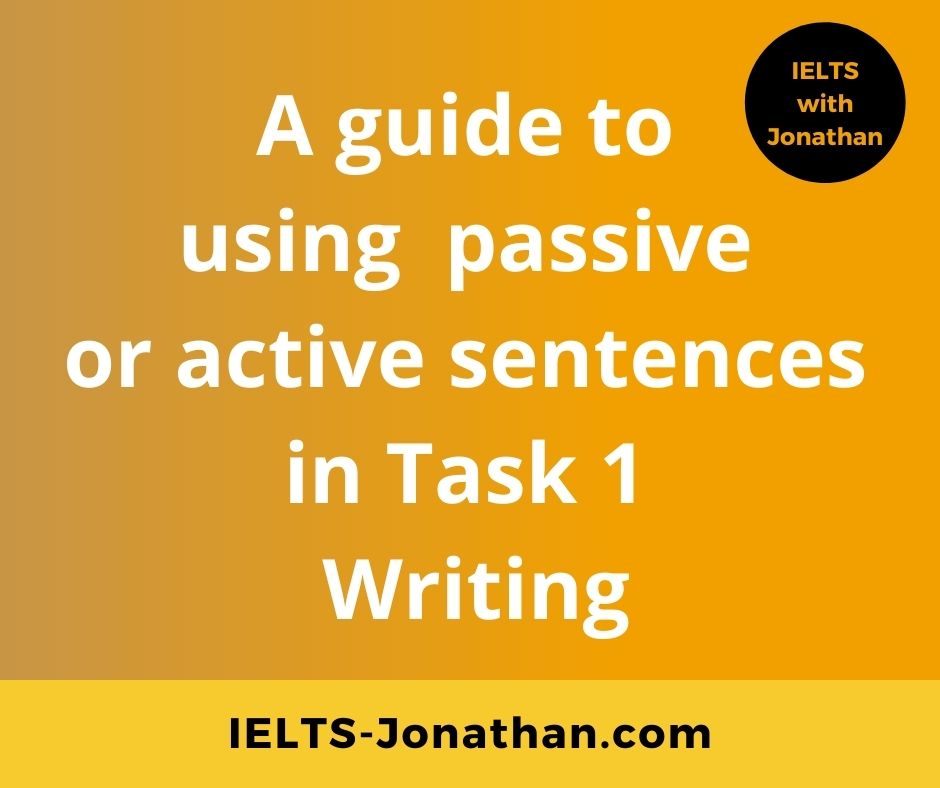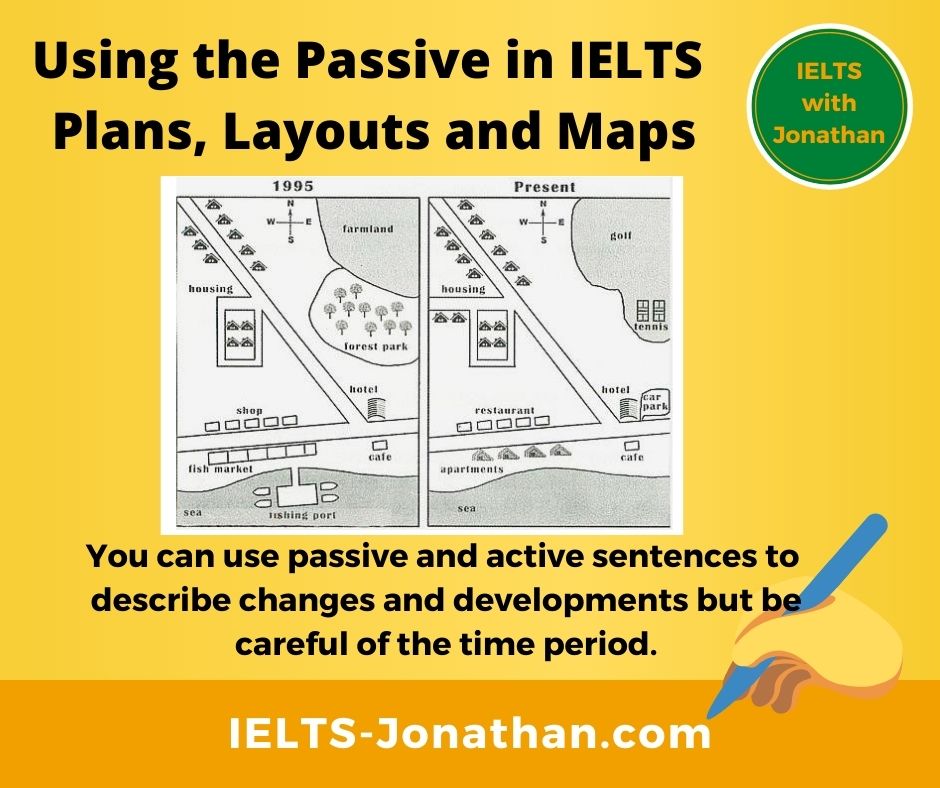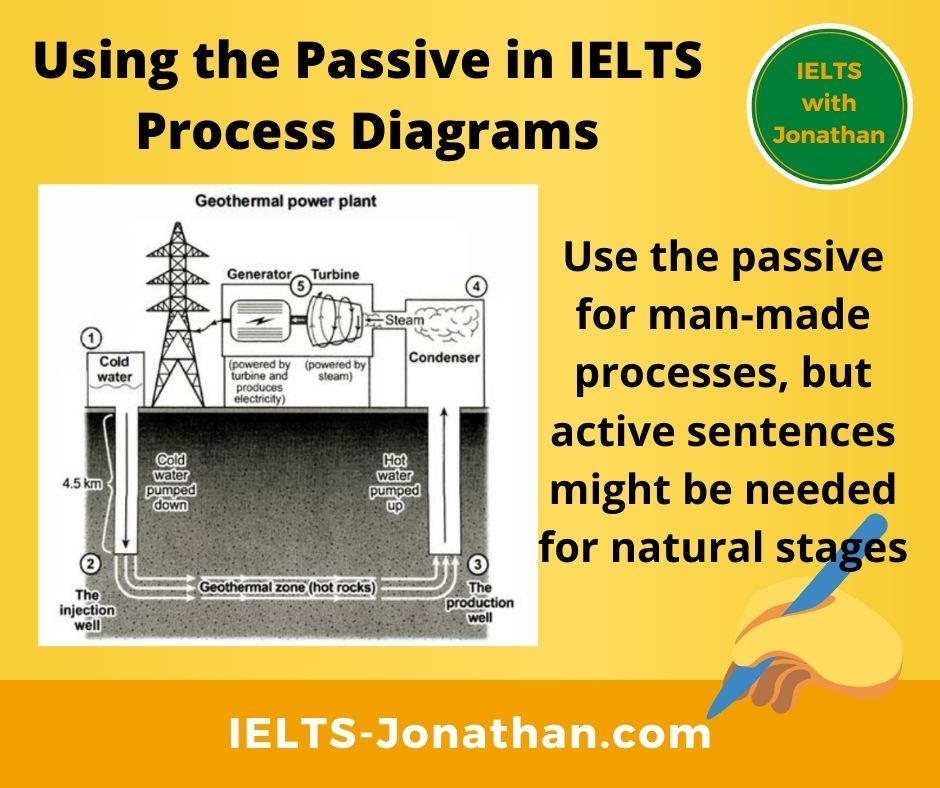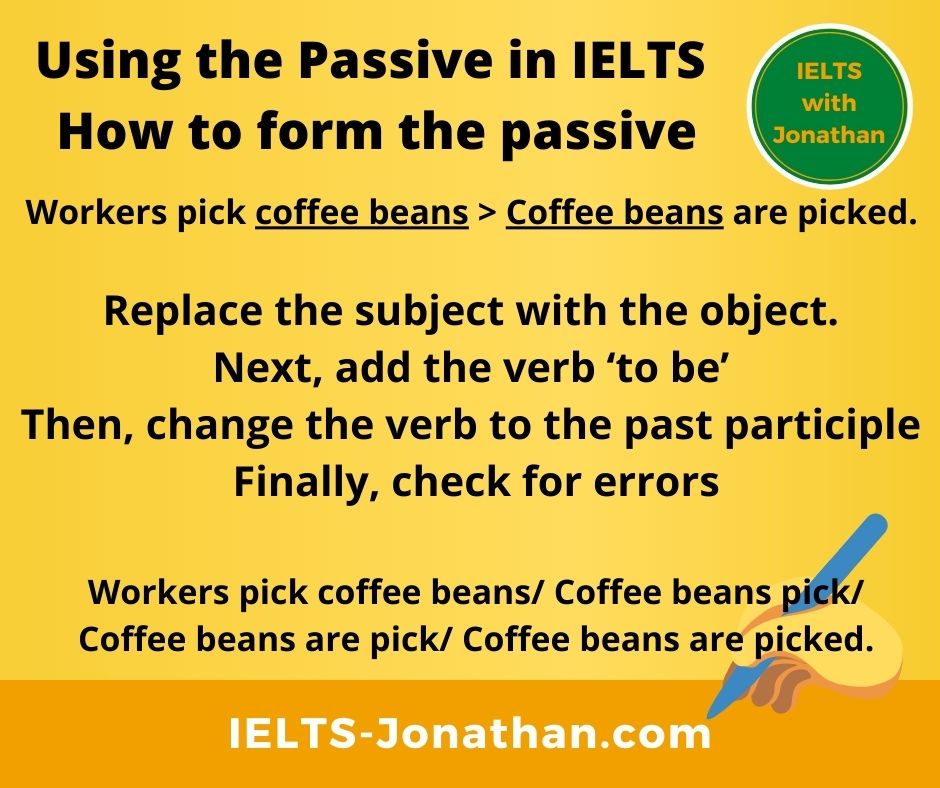Using the passive voice in IELTS writing
One area that can confuse IELTS students is how and when to use passive sentences in IELTS writing.
In some writing tasks, the passive is a requirement for accurate reporting and in others it’s not appropriate. This can lead to confused writing and inaccurate reports.

If you are not sure how to make or use passive sentences, or unsure where to use this tense in IELTS, follow this basic review to check what you already know and review some IELTS examples.
This will be good for your General English level, as well as for the Practical Skills Task of IELTS. 😊
Why the passive is important in IELTS
In Task 1, there are a number of tasks where the focus of the report is on changes, stages, developments or trends rather than on comparing numbers, percentages or amounts.
Really clear examples of this can be seen in maps and plans (changes and developments) and in process diagrams (stages and sequences of making something).
Your IELTS report really needs to focus on the information at hand. Using the passive in these examples means the report is accurate, to the point and omits any unnecessary information.
A further advantage is that using the passive is, in effect, a good way of paraphrasing the writing task.
What is the passive?
A passive sentence is where the subject that carries out an action of the verb is omitted.
In IELTS writing, these sentences are useful because who carries out the actions is often obvious from the question or unimportant.
Including the subject in your writing would also add too many words to the task.
Compare these two examples.
The coffee beans are laid out in a field to dry.
The coffee beans are laid out in a field by workers to dry.
Which sentence is clearer? Which one has obvious or unnecessary information?
I hope you choose the first one😊
Here’s another example on the same topic
Workers pick the coffee beans. (the focus (subject) is on workers, but the question is about coffee beans)
The raw coffee beans are picked by hand (this is additional information which adds to your writing)
The raw coffee beans are hand-picked. (this is higher-level language which adds to your writing)
The raw coffee beans are hand-picked by workers. (this is the agent, and is unnecessary; the context is clear)
Which sentence would report and display the level of your language best?
How the passive is formed
As long as you are familiar with your past tense verbs, the passive is not difficult to form.
An active sentence is made passive by adding the verb ‘to be’ and a past participle of the original verb, like this example:
Workers pick coffee beans. Coffee beans are picked
See how ‘coffee beans’ replace the original subject, ‘workers’.
The original subject is often unnecessary, but if you do want to include it, it can be used with ‘by’ or ‘with’ at the end of the clause, like this,
Coffee beans are picked by workers.
TIP: if you decide to include the agent in IELTS, there are two prepositions used to reintroduce the agent, by and with.
What is the difference between BY or WITH in the passive?
By is used to reintroduce the person while with is often used with instruments, objects or materials.
By
The machinery is operated by factory workers.
With
The bookcase has been replaced by/with a table.
The beans are sorted and graded by/with an automated machine.
More passive examples
Look at these examples and see how the verb ‘to be’ is added in a different form to the original sentence.
Active to Passive
He plants the tree – The tree is planted
He will plant the tree – The tree will be planted
He had planted the tree -The tree has been planted
He could plant the tree – The tree could be planted
He is going to plant the tree – The tree is going to be planted
Can you see a pattern?
It’s not too difficult, is it?
The number of passive tenses
There’s more good news!
Passive tenses are generally limited in IELTS to present or future simple, past simple, perfect simple and past perfect simple so no complicated choices.
Just read the legend or the question to understand the time periods.
In a process diagram, where no time period is usually given, use the present simple passive tense.
Writing errors
I see major student errors that can be corrected easily, the most common being changes in subject/verb agreement.
When the subject changes, it is easy to forget that the verb agreement might change too!
Look at how the verb changes in these examples.
He plants the trees
The trees are planted, not (The trees is planted) Singular to plural
They plant the tree.
The tree is planted, not (the tree are planted) Plural to singular
Simple grammar, but it’s surprising how this simple mistake can appear in the test!
Where can the passive be used in IELTS
Remember, the passive is generally used in maps and plans to describe changes and developments over a time period and in process diagrams to report the stages and sequences in making or producing something.
Map and Plans
Always read the question and the legend to understand the time period. It’s possible a present simple, past simple, present perfect or a future tense can be used in the passive.

The shops have been replaced by restaurants.
The farmland has changed use to a golf club and tennis courts.
The hotel has gained a car park.
Apartments have been built were there was a fish market and a fishing port.
Process Diagram
Process diagrams generally have no dates, so only the present simple passive is used.

Cold water is pumped below ground to a distance of 4.5 kilometres.
The hot water condenses and changes into steam (!)
The steam powers a turbine which then generates electricity. (!)
The electricity is sent by wire to electric pylons which connects to houses and factories.
TIP: (!) Be careful with process diagrams which show a natural process. In these cases, the subject is important!
There is a clear difference in how ‘solar energy is generated’ by man and how ‘adult fish spawn and reproduce’.
So, when a process is natural, use active sentences to focus on the subject.
The mature salmon swim upstream to the spawning areas.
When the cloud cools, water droplets form.
When the process is man-made, use passive sentence to focus on the results.
The coffee beans are picked, laid out and dried in a sunny field.
The finished product is packaged and then transported to shops for retailing to customers.
TIP: Sometimes there may be a mix of man-made and natural processes!
Try these IELTS related activities
Complete these sentences using the prompts in the correct passive tense? (there is only one correct answer)
Finally, why the passive is used (this is a passive sentence!)
As a further reference item, the Passive is used in General English for a number of other reasons:
When the agent (=the person who does the action) is not known, not important or obvious from the context.
A protestor was shot. (We don’t know who shot the protestor.)
This Imperial Palace Museum was established in 1925. (Unimportant agent)
The thief has been arrested. (Obviously by the police
To make something more polite or formal
Your room hasn’t been cleaned. (is more polite)
(You haven’t cleaned your room. – is less polite)
When the action is more important than the agent, as in processes, instructions, events, reports, headlines and in news items.
A number of people were affected by the disaster.
To place emphasis on the agent.
The airport will be opened by the current President.
Adapted from J. Thomson and A.V. Martinet, A Practical English Grammar, Oxford University Press, 1986
If you liked this post or it was useful then please share and add a comment below.
I’m Jonathan
I’ve taught IELTS and University English in more than a dozen universities and schools around the world.
I’m a parent, traveller and passionate about language teaching and helping students achieve their dreams.
Whilst living in Austria or working in Asia, I run IELTS courses to help students get to where they want to be.
If you are serious about IELTS, connect with me to see how I can help you.




Was this helpful? Leave a comment :)